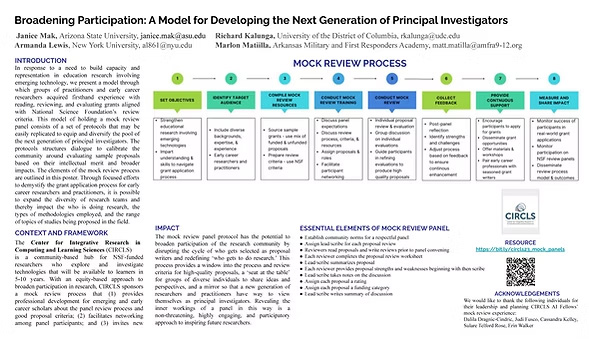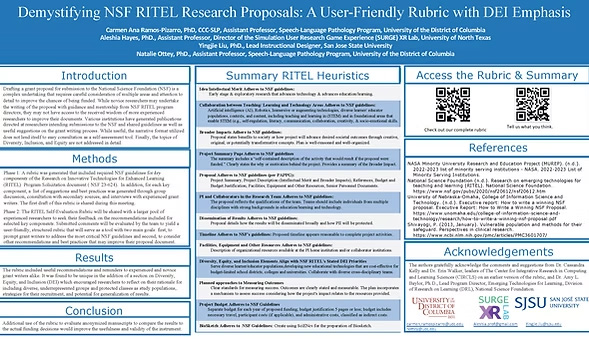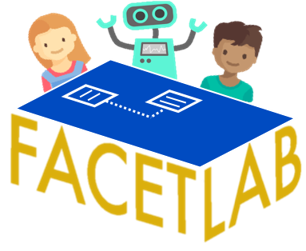AI CIRCLS
CIRCLS previously hosted Expertise Exchanges (AI CIRCLS) on topics related to Artificial Intelligence for any and all members of our community interested in intersections of AI with other topics. These expertise exchanges ran anywhere from 2-4 months at a time, meeting regularly in that time period and working towards specific actionable steps related to the theme of each exchange (either as a group or individually). Our hope was to create a space where our community members could meet others with similar interests, learn from and with each other, and explore shared visions for the future of learning technologies. To learn more, see our Expanding AI CIRCLS plenary presentation from the CIRCLS' 23 Convening and see further details about each expertise exchange below.
Expertise Exchanges
- AI and Education Policy Expertise Exchange
- AI CIRCLS Community Partnerships in Research
- AI CIRCLS Project Incubator
- AI CIRCLS Mock Review Panels
- AI CIRCLS and JCHE Collaboration
AI and Education Policy Expertise Exchange (2021)
The first AI CIRCLS Expertise Exchange, AI and Education Policy, ran from March-June, 2021. The exchange took place bi-weekly over 7 sessions on Zoom, with a total involvement of 49 total community members. Participants represented multiple stakeholders including faculty members, graduate students, industry experts, K-12 teachers, and district representatives. The goals of the exchange were to: 1) Promote learning through a Speaker Series that brought community members together to share their knowledge and expertise related to AI and Education Policy, 2) Synthesize ideas to develop Community Resources surrounding AI and Education Policy issues, and 3) Effect change by converging on a set of Policy Initiatives to be pursued in smaller groups by Exchange Members.
Poilicy Initiatives
In its final sessions, the exchange split into three small groups to create policy briefs and deliverables. Each initiative links to a policy document:
- Initiative One: AI in EdTech Vendor Pledge
- Initiative Two: Policy Brief on Federal Guidelines for AI in EdTech
- Initiative Three: School Policies for Integrating AI in Classroom Practices
Community Resources
The exchange has led to two main community resources:
- AI and Education Policy Reading List: The AI and Education Policy Reading List (pp. 26-39) is an annotated compilation of websites, primers, reports, academic articles, and databases that were shared by Exchange members over the course of our sessions. The reading list focuses on the intersections of policy, AI, and education in global and national settings, and provides additional starting points for learning about AI privacy and AI resources for educators.
- Identification of Priority Areas in AI and Ed Policy: As a result of the discussions surrounding the Speaker Sessions, members identified four high priority concerns in AI and Education Policy: transparency and disclosure, communication and user agency, AI literacy, and ethics and equity. Members created a taxonomy of potential actions to take surrounding those concerns.
All videos of exchange meetings, slide decks, and activities are available to Exchange Members. If you are interested in being added to this folder, please contact us.
Speaker Series
The AI and Ed Policy Expertise Exchange hosted four speakers sessions on global, national, state-level policy initiatives, as well as an educator panel and workshop on a forthcoming product certification.
Speakers Session 1: Global and National AI and Ed Policy Initiatives
- Kasey Van Ostrand is the Project Director for policy partnerships at Digital Promise, and spoke on her current work with the U.S. Office of Educational Technology on the 2021 National Education Technology Plan (NETP). The NETP sets a vision and plan for learning enabled by technology, and hopes to include a plan for AI in Education in the 2021 iteration. Aside from this plan, Kasey explained the U.S. Dept. of Education has the power to coordinate stakeholders, provide national recommendations, and offer federal grants and incentives to people continuing this work.
- Joseph Fatheree is a doctoral student and long-time K-12 educator who spoke on his work as part of the advisory committee working on an International Ethical Framework for AI in Education with The Institute for Ethical AI in Education in the UK. The framework, released in March 2021, sets eight key objectives for ethical AI development and was developed through a series of discussions with experts and round tables dedicated to the participation of young people.
Speakers Session 2: State Curriculum Initiatives
- Dr. Amy Eguchi is an Assistant Teaching Professor in the Department of Education Studies at University of Florida. Amy takes part in the AI for K-12 initiative, jointly sponsored by AAAI and CSTA, as an advisory group member, and spoke on the AI4K12's big ideas and AI curriculum initiatives. AI4K12 aims to develop national guidelines for teaching AI, develop curated AI resources for K-12 teachers, and foster a community of stakeholders, specifically developing capacity for curriculum planning on a state level.
- Dr. Marlo Barnett is the Vice President for Computer Science for Illinois #CS4IL, and Vice President for Computer Science Teachers Association, CSTA-Chicago, and AI4K12 member. She spoke on her experience introducing legislation in the state of Illinois and writing the nationwide framework for Artificial Intelligence K-12. The Illinois CS legislation, passed in March of 2021, set standards for CS curriculums and literacy to be adopted in all Illinois schools between 2021-2024.
Speakers Session 3: Panel of Educators
- Nancye Black, Cameron Fadjo, Kip Glazer, and David Lockett spoke on their experiences as educators and in advocating for responsible AI and EdTech implementation in various K-12 settings, sharing concerns and hopes for future AI regulation. Some major takeaways from this panel included the necessity of funding professional development for teachers to build opportunities for AI literacy, the need to alleviate teacher workload to be able to build time for technology standards, and the ability for all stakeholders to advocate for themselves to introduce major legislation with the support of organizations like the International Society for Technology Education.
Speakers Session 4: EdTech Equity Product Certification
- Trisha Callella is the current Product Partnerships Director at Digital Promise and led a workshop on the work-in-progress EdTech Equity product certification that she has been developing alongside Madison Jacobs and Nidhi Hebbar at the
- EdTech Equity Project. The product certification requires companies to meet and demonstrate specific equity standards in all cycles of AI tool development such as ideation, training/testing, and design/implementation.
Organizers
Erin Walker & Leah M. Friedman
AI CIRCLS Community Partnerships in Research (2021)
Building on the momentum and ideas discussed during the CIRCLS'21 convening, AI CIRCLS hosted a discussion series focused on building effective community/practitioner-research partnerships. The discussion series contained opportunities to learn and act; we convened speakers with experience in community partnerships for six sessions of presentations and discussions, and asked participants to bring in their own questions, concerns, and experiences with establishing community partnerships. Sessions centered on partnerships with schools, formal learning environments, and partnerships with community organizations that create opportunities for learning outside of school. Discussions were approached through a specific lens of equity and social justice in establishing community partnerships, grounded in the RETTL context (with a particular focus on AI and education).
Community Partnerships Resources
From the series, two resources emerged for the CIRCLS community to reference when establishing, building, and maintaining their partnerships. We are excited to share those resources here:
- Community Partnerships Planning Guide: This template is meant for researchers who are looking to become better partners with their non-academic collaborators. You will find a series of guiding questions developed from themes presented by our speakers. Reflection areas in this template include:
- Pre-work and goal setting
- Co-creating partnerships
- Power dynamics
- Institutional and IRB practices
- School partnerships
- Community and family relationships
- Final reflections
- Community Partnerships Speaker Summary: This summary document describes ideas that were covered in the AI CIRCLS Community Partnership series. You'll find an overview of ideas discussed by all of the speakers in the series.
Community Partnerships Series Overview
AI CIRCLS' discussion series on community partnerships kicked off on January 21, 2022 and continued through April 1, 2022. We hosted the following sessions and speakers, described in depth in our summary document:
- Kickoff and Goal Setting Session
- The Noise Project
Featuring Makeda "Dread" Cheatom, Marilu Lopez Fretts, Karen Purcell, Berenice Rodriquez, Phyllis E. Turner, Bobby Wilson - School Partnerships
Featuring Jamie Lewsadder and Emily Nestor (CTO at La Canada United School District and Technology Specialist at Talladega County Schools, respectively) - Informal Science Centers
Featuring Andres Henriquez (formerly NY Hall of Science) - Daigwade Project
Featuring Breanne Litts, Rios Pacheco, Patty Timbimboo-Madsen, Lilly Martinez, and Brayden Gulso - Chicago Beyond
Featuring Jon Ervin
Organizers:
Erin Walker, Leah M. Friedman, & Kip Glazer
AI CIRCLS Project Incubator (2022)
AI CIRCLS held a "project incubator" Expertise Exchange on the topic of Literacy and Artificial Intelligence. For the purposes of this project incubator, we drew on our definition of literacy from the American Council on the Teaching of Foreign Language and the National Council of Teachers of English (see definition here). This includes language-related literacies like reading, writing, speaking, etc., but also expands the definition of literacy to include skills that are useful to synthesizing and presenting information in today's media/information-rich environments.
This expertise exchange aimed to bring together interdisciplinary teams to ideate research proposals relevant to community partners, educators, learning scientists, computer scientists, and social scientists. Over the course of several months, a dedicated space and structure was provided for ideating research ideas, and resources were offered to support grant writing, especially related to future submissions to the National Science Foundation's Request for Proposals for Research on Emerging Technologies for Teaching and Learning (NSF RETTL RFP).
Participants (see list below) focused on ideating research by brainstorming the future for literacy and educational technology and worked backward to create projects. This incubator intentionally centered equity and justice frameworks, mutually beneficial community partnerships, and responsible/ethical AI. Some participants have continued their collaboration and a subgroup of participants have been developing a synthesis of lessons learned from the Incubator to be submitted as a journal publication in 2024.
Project Incubator Participants 2022:
Malihe Alikhani
Chidi Asoluka
Roghayeh (Leila) Barmaki
Tina Cheuk
Aakash Gautam
Kip Glazer
Ligia Gomez
Layne Jackson Hubbard
John Licato
Lin Lin Lipsmeyer
Joshua Littenberg-Tobias
Rachna Mathur
Katie McCarthy
Megan Pattenhouse
Yolanda A. Rankin
Sulare Telford Rose
Jennifer Sabourin
Stephen Uzzo
Ryan Watkins
Joanna Weidler-Lewis
Marjorie A. Zielke
Organizers
Erin Walker & Leah M. Friedman
AI CIRCLS Mock Review Panels (2023)
AI CIRCLS completed a Mock Review Panel series with 42 participants. The goal of this series was to broaden participation in current and future NSF programs and offer professional development to the next generation of principal investigators. Participants reviewed and evaluated proposals on emerging educational technologies using the NSF review criteria and reflected on the insights that emerged from the process. The program explicitly outlined what to expect when participating in the review process, as well as how to be considered for serving on a future review panel. A Fellows Tier of select participants (see list below), who consisted of researchers, doctoral candidates, K-12 educators, and industry professionals engaged in additional professional development activities related to grant proposal preparation and synthesized their reflections from the overall experience (see Summary of Synthesis Themes and their poster presentations from our CIRCLS '23 Convening below).
Mock Review Panels 2023 Fellows Tier:
Sindhu Chennupati, Arizona State University
Tina Cheuk, California Polytechnic State University
Valerie Crawford, Glades Middle School
Aleshia Hayes, University of North Texas
Richard Kalunga, University of the District of Columbia
Armanda Lewis, New York University
Yingjie Liu, San Jose State University
Janice Mak, Arizona State University
Marlon Matilla, Arkansas Military and First Responders Academy
Natalie Ottey, University of the District of Columbia
Carmen Ana Ramos-Pizarro, University of the District of Columbia
Team Projects

Broadening Participation: A Model for Developing the Next Generation of Principal Investigators
Authors:
Janice Mak, Marlon Matilla, Armanda Lewis, and Richard Kalunga
Abstract:
In response to a need to build capacity and representation in education research involving emerging technology, we present a model through which groups of practitioners and early career researchers acquired firsthand experience with reading, reviewing, and evaluating grants aligned with National Science Foundation's review criteria. This model of holding a mock review panel is a promising approach to equipping diverse groups of potential grant applicants to engage in dialogue to calibrate around defining what constitutes a high quality proposal based primarily on whether or not the sample proposals exhibit intellectual merit and broader impacts. The elements needed to implement a successful mock review process and suggested protocol are outlined in this poster and potential spaces to apply this mock review process. Through focused efforts to demystify the grant application process for early career researchers and practitioners, it is possible to expand the diversity of research teams and the research done in the field.
Project Brochure and Poster (PDF)

Demystifying NSF RITEL Research Proposals: A User-Friendly Rubric with DEI Emphasis
Authors:
Carmen Ana Ramos-Pizarro, Aleshia Hayes, Yingjie Liu, and Natalie Ottey
Abstract:
This project aims to demystify grant solicitation by unpacking it into a user-friendly rubric format that includes essential items researchers should address and valuable best practices recommendations. Suggested guidelines for Diversity, Equity, and Inclusion (DEI) are highlighted for consideration in all project phases.
Rubric for Self-Evaluation of NSF RITEL Grants in Progress and Poster (PDF)
Orgainzers:
Erin Walker, Cassandra Kelley, Sulare Telford Rose, Judi Fusco, & Dalila Dragnić-Cindrić
AI CIRCLS and JCHE Collaboration (2023-2025)
AI CIRCLS is collaborating with the Journal of Computing in Higher Education (JCHE) on a special issue on AI and education equity in higher education. Six emerging scholars, whose work centers around themes related to diversity, equity, inclusion, belonging, and social justice in educational technology, will participate as an advisory board on the special issue (see list below). From the period of November 2023-December 2024, advisory board members will consult on requirements for how articles in the special issue engage with ideas related to equity, as well as interact with potential authors directly to answer questions and give feedback on their work. The Advisory Board gave an invited panel at the online Empower Learners for the Age of AI (ELAI) 2023 Conference (click to view the ELAI Panel recording) and recently developed this document entitled, Advice for JCHE Special Issue Authors, with further guidance and curated resources for authors.
Below are some additional resources and we welcome other perspectives:
- Artificial Intelligence in Education: A Reading Guide Focused on Promoting Equity and Accountability in AI (pp. 118-123)
- CIRCLS' Reading List: AI and Education Policy (pp. 26-39)
- Guidance for generative AI in education and research (UNESCO, 2023)
- Indigenous AI (Lewis et al., 2020)
- Trustworthy Machine Learning (Varshney, 2022)
JCHE Special Issue Advisory Board:
Kenya Andrews, University of Illinois at Chicago
Francisco Castro, New York University and University of Massachusetts Amherst
Jaemarie Solyst, Carnegie Mellon University
Tiera Tanksley, University of California, Los Angeles
Benjamin Xie, Stanford University
Lili Yan, Michigan State University
JCHE Special Issue Guest Editors:
Lin Lin Lipsmeyer, Southern Methodist University
Nia Nixon, University of California, Irvine
Judi Fusco, Digital Promise
Cassandra Kelley, University of Pittsburgh
Erin Walker, University of Pittsburgh
For further updates about the special issue, please continue to monitor this page.
